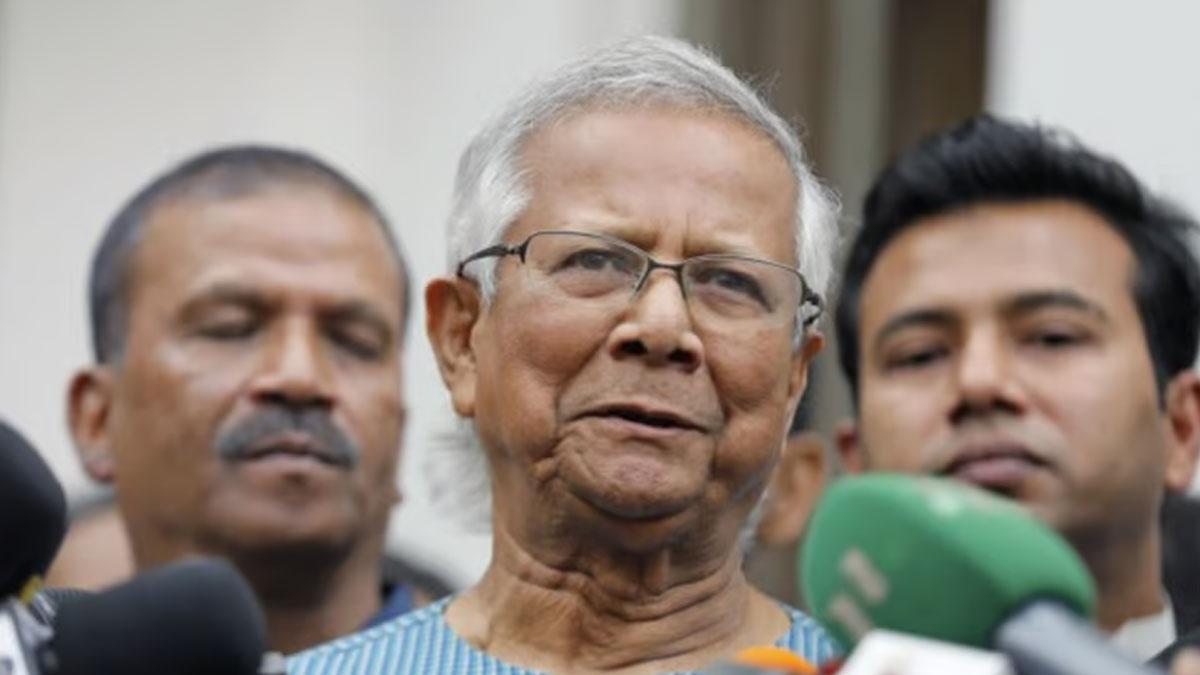Nobel laureate Muhammad Yunus was sworn in as the head of an interim government on Thursday, succeeding Sheikh Hasina, who resigned suddenly and fled to India amid wide-scale unrest over a contentious job quota system. At 84, Yunus was sworn into the office by President Mohammed Shahabuddin during a ceremony at the Bangabhaban Palace.
He formed an advisory council comprising 16 members to help him rule the country. The members included prominent persons like Md. Nahid Islam and Asif Mahmud, who are from the Anti-Discrimination Student Movement.
In the inaugural speech, Yunus vowed to take action against the elements involved in chaos and anarchy to hamper the freedom of the nation. He took oath as chief adviser; a prime minister-like position. The ceremony was attended by political leaders, judges, representative of various organizations, military and police chiefs, diplomats including Indian High Commissioner Pranay Verma, freedom fighters, senior journalists and other eminent personalities.
The members of the advisory council are Farida Akhtar, Hefazat-e-Islam's deputy chief AFM Khalid Hossain, Grameen Telecom trustee Nurjahan Begum, freedom fighter Sharmeen Murshid, Chittagong Hill Tracts Development Board chairman Supradip Chakma, Prof. Bidhan Ranjan Roy, and former foreign secretary Touhid Hossain. Roy, Chakma, and Bir Pratik Faruk-e-Azam could not attend the ceremony as they were all outside Dhaka.
This interim government is responsible for conducting the country towards an elected government. Before coming to power, Yunus promised to bring back safety and stability in the country. He termed Hasina's deposition as the second independence of the nation. Yunus arrived in Bangladesh from Paris via Dubai on an Emirates flight. At the airport, he was received by army chief General Waker-Uz-Zaman, senior officials and student leaders and members of the civil society.
An elated Yunus stated at the press conference at Hazrat Shahjalal International Airport, Dhaka: "Today is a day of our pride. We have gained our independence for the second time, and we must protect it." He expressed gratitude to the youth who spearheaded the agitation against Hasina and called for an end to violence in order that development might take place.
Yunus called upon every citizen to cooperate with him in the task of rebuilding the country, to take responsibility for the maintenance of peace. He added that the prevention of further attacks is the first priority of the interim government, which had to name these acts of violence and attacks against minorities as part of a "conspiracy." According to Yunus, the formation of a government that ensures the safety of its citizens is of paramount importance.
The country has been wracked by severe unrest in recent weeks, with more than 500 deaths related to protests by students against the quota system, which was largely dismantled after the Supreme Court came out in support of the students. Yunus paid tribute to Abu Sayed, a student activist killed early in the protests.
Responding to the appeal by Yunus, police personnel have started rejoining their duties. Several police stations were ransacked and set ablaze following the ousting of the Hasina government that led to the exodus of police personnel from their stations in view of threats to their lives. A police headquarters press release said that citizens from all walks of life, including political bigwigs and students have rallied behind the cause of police personnel for ensuring their security while on duty.
The chief of the army, in announcing the interim government, did not say how long it would last, although he had hopes that normalcy could return within a few days. Yunus, whose name was first proposed by coordinators of the student movement, congratulated students for their part in what he called the "Second Victory Day" and implored them to resist any further violence. He warned that violence would lead to utter destruction and urged cool heads to prevail, with everyone pitching in to assist in the nation's recovery.
Yunus's Grameen Bank anti-poverty model had influenced the globe, but his ties with Hasina's government had soured. Authorities launched probes against him ever since Hasina came to power in 2008, sacking him from Grameen Bank and slapping several cases on him. Many feel Hasina's anger against Yunus turned into anger when he announced plans to form a political party in 2007 at a time when Hasina was behind bars under a military-backed dispensation.
Read also | Israel Intensifies Intelligence Efforts to Target Yahya Sinwar
Read also | Pakistan Reportedly Considering Missile Supply to Iran Amid Rising Tensions


















